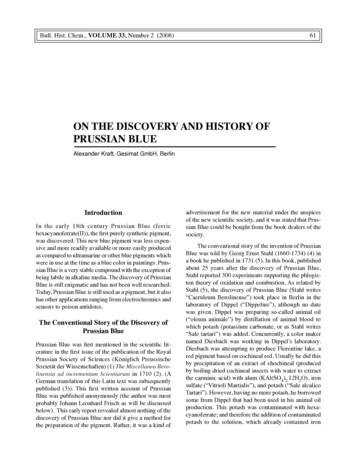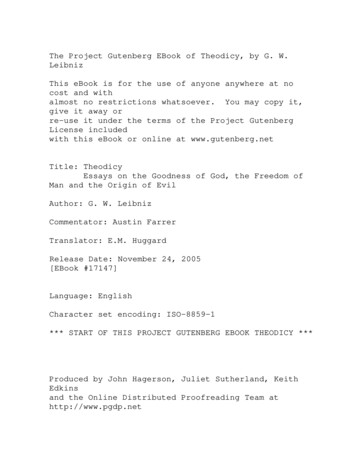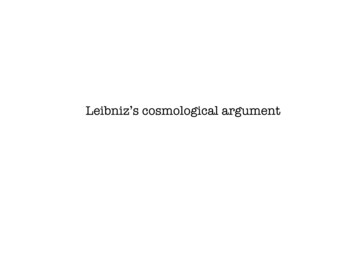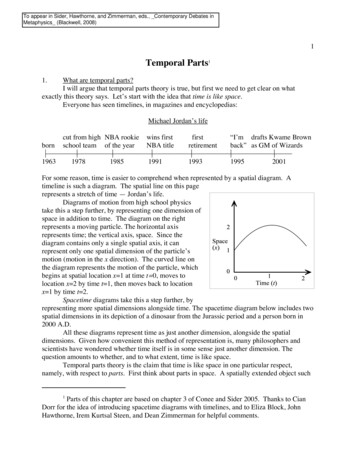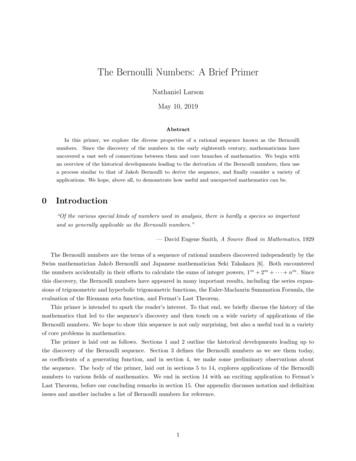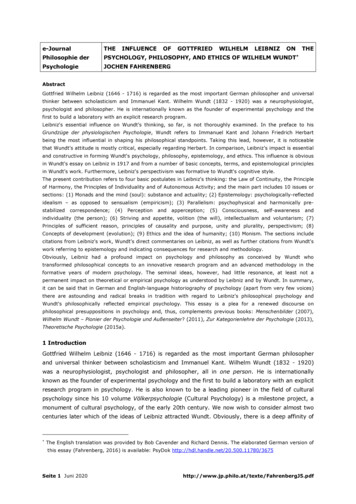
Transcription
e-JournalTHEPhilosophie derPSYCHOLOGY, PHILOSOPHY, AND ETHICS OF WILHELM gieJOCHEN FAHRENBERGTHEAbstractGottfried Wilhelm Leibniz (1646 - 1716) is regarded as the most important German philosopher and universalthinker between scholasticism and Immanuel Kant. Wilhelm Wundt (1832 - 1920) was a neurophysiologist,psychologist and philosopher. He is internationally known as the founder of experimental psychology and thefirst to build a laboratory with an explicit research program.Leibniz's essential influence on Wundt's thinking, so far, is not thoroughly examined. In the preface to hisGrundzüge der physiologischen Psychologie, Wundt refers to Immanuel Kant and Johann Friedrich Herbartbeing the most influential in shaping his philosophical standpoints. Taking this lead, however, it is noticeablethat Wundt's attitude is mostly critical, especially regarding Herbart. In comparison, Leibniz's impact is essentialand constructive in forming Wundt's psychology, philosophy, epistemology, and ethics. This influence is obviousin Wundt's essay on Leibniz in 1917 and from a number of basic concepts, terms, and epistemological principlesin Wundt's work. Furthermore, Leibniz's perspectivism was formative to Wundt's cognitive style.The present contribution refers to four basic postulates in Leibniz's thinking: the Law of Continuity, the Principleof Harmony, the Principles of Individuality and of Autonomous Activity; and the main part includes 10 issues orsections: (1) Monads and the mind (soul): substance and actuality; (2) Epistemology: psychologically-reflectedidealism – as opposed to sensualism (empiricism); (3) Parallelism: psychophysical and harmonically lity (the person); (6) Striving and appetite, volition (the will), intellectualism and voluntarism; (7)Principles of sufficient reason, principles of causality and purpose, unity and plurality, perspectivism; (8)Concepts of development (evolution); (9) Ethics and the idea of humanity; (10) Monism. The sections includecitations from Leibniz's work, Wundt's direct commentaries on Leibniz, as well as further citations from Wundt'swork referring to epistemology and indicating consequences for research and methodology.Obviously, Leibniz had a profound impact on psychology and philosophy as conceived by Wundt whotransformed philosophical concepts to an innovative research program and an advanced methodology in theformative years of modern psychology. The seminal ideas, however, had little resonance, at least not apermanent impact on theoretical or empirical psychology as understood by Leibniz and by Wundt. In summary,it can be said that in German and English-language historiography of psychology (apart from very few voices)there are astounding and radical breaks in tradition with regard to Leibniz's philosophical psychology andWundt's philosophically reflected empirical psychology. This essay is a plea for a renewed discourse onphilosophical presuppositions in psychology and, thus, complements previous books: Menschenbilder (2007),Wilhelm Wundt – Pionier der Psychologie und Außenseiter? (2011), Zur Kategorienlehre der Psychologie (2013),Theoretische Psychologie (2015a).1 IntroductionGottfried Wilhelm Leibniz (1646 - 1716) is regarded as the most important German philosopherand universal thinker between scholasticism and Immanuel Kant. Wilhelm Wundt (1832 - 1920)was a neurophysiologist, psychologist and philosopher, all in one person. He is internationallyknown as the founder of experimental psychology and the first to build a laboratory with an explicitresearch program in psychology. He is also known to be a leading pioneer in the field of culturalpsychology since his 10 volume Völkerpsychologie (Cultural Psychology) is a milestone project, amonument of cultural psychology, of the early 20th century. We now wish to consider almost twocenturies later which of the ideas of Leibniz attracted Wundt. Obviously, there is a deep affinity of*The English translation was provided by Bob Cavender and Richard Dennis. The elaborated German version ofthis essay (Fahrenberg, 2016) is available: PsyDok http://hdl.handle.net/20.500.11780/3675Seite 1 Juni 2020http://www.jp.philo.at/texte/FahrenbergJ5.pdf
The influence of Gottfried Wilhelm Leibniz on Wilhelm WundtJochen Fahrenbergthought. And some of the ideas today, another century later, may be essential to further developfundamental questions and controversies within psychology. However, this development of ideashas scarcely been investigated in the history and theory of psychology.Wundt's distinctive appreciation will be cited as an onset here:"Leibniz, who was the founder of German idealism and who, at first, gave his dialectical frameworkto the later idealism gleaned from Fichte to Hegel, to the triad of logic-mathematical axioms:identity, contradiction, and reason, thus submitting his metaphysics to psychological consideration.The name with which he describes the work containing his general outlook on the world ischaracteristic. He does not call it metaphysics according to transcendence, but monadology,meaning a philosophy of the mind from the point of view of psychological analysis assuming thatthe spiritual life is the basis of reality. In addition to this, he often assumed ideas on which today'spsychology is once again concerned with and seeks to develop them on the basis of wideningexperience" (Wundt, 1900-1920, vol. 10, p. 212 f).With the 300th anniversary of his death, Leibniz is still known as a great philosopher,mathematician and universal thinker. However, his influence on psychology is seldom mentioned.Leibniz does not use the term psychology, nor does he write about empirical psychology("Seelenkunde") as happens in the following century (e.g., Carus, 1808; Luccio, 2013; Vidal,2011). He does, though, analyse psychological relationships as well as reporting everydaypsychological observations and experiences along with conveying principles of knowledge. In thephilosophical secondary literature on Leibniz, psychology remains merely a marginal theme as isthe case with Leibniz in recent books on the history of psychology. When thoroughly researched, adifferent picture emerges, if not from the Leibniz literature, but from the work of Wilhelm Wundt.He founded the first psychological laboratory in 1879 and developed psychology as an independentdiscipline at the University of Leipzig where Leibniz was born in 1646. Especially in Wundt's work itshould be investigated, when reference is to be made to Leibniz's ideas in the field of modernpsychology.On the two hundredth anniversary of his death in 1916, Leibniz was recognized by Wundt as thefounder of the new philosophy in Germany. Many years earlier, Wundt had conceived "the boldplan of writing a scientific Leibniz biography", inspired by Leibniz's mathematical-physical work,then by his philosophical ideas. In his essay on Leibniz, Wundt (1917) takes 132 pages to portrayhow Leibniz replaced scholastic thinking with his refined position of idealism: The world and theprinciples of continuity and dynamic changes are to be understood in terms of mathematics; thechanges follow the law of continuity, the principle of causality and the principle of purpose, thuscorresponding to the doctrine of sufficient reason (nihil est sine ratione sufficiente) – philosophicalreasoning shows the world's harmony and, despite differences in perspective, its unity withinplurality (unitas in multitudine).11A detailed review of this Leibniz article comes from Schwaiger (1918). He thinks that Wundt "especially takesup the issues which are essentially related to his own convictions. This means that those philosophical ideaswhich are intrinsically valid: Development and unity, the actuality of intellectual life, activity and aspiration,voluntarism, epistemological idealism, and with a special emphasis on mathematical-scientific research,historical appraisal of tradition." According to Wundt, nature and mind ( soul) are, for Leibniz, in the lastanalysis, neither different substances, nor different attributes of one substance, but complementary points ofview in the conception of the world. The psychologically decisive among them is the inner experience. This isbecause it embraces the content of reality for us: "it is power, activity and intention" (p. 157). – In contrastSeite 2e-Journal Philosophie der Psychologie
The influence of Gottfried Wilhelm Leibniz on Wilhelm WundtJochen FahrenbergWundt shows the depth of Leibniz's reflections on subjects such as: proof of the existence of Godand theodicy, monadology, the actuality and continuity of the mental processes (soul mind orreason), the principle of sufficient reason, the principle of harmony and the unity of the sciences.One principle in the thinking of Leibniz played a fundamental role: "the principle of equality ofseparate but corresponding viewpoints." Wundt characterized this style of thought in a way thatalso applied for him – viewpoints that "supplement one another, while also being able to appear asopposites that only resolve themselves when considered more deeply" (Wundt 1917, p. 117).Wundt does not use the term perspective coined by Leibniz, but perspectivism is a fundamentalcharacteristic of Wundt's own thinking.Wilhelm WundtIf we are concerned with the influence of Leibniz's thoughts on Wundt, at least some biographicalnotes must be given on his initial standpoint and his significance for psychology. He was initially aphysician and a well-known neurophysiologist before turning to sensory physiology andpsychophysics. He was also an internationally-renowned neurophysiologist, had supervisedlaboratory training in experimental physiology in Heidelberg and since 1859 had also lectured onanthropology and medical psychology, before 1874 accepting the Chair of Inductive Philosophy (aphilosophy which emanates from the empirical sciences), in in Zürich. A year later he was thencalled to one of the two Chairs in Philosophy at the University of Leipzig.Wundt's understanding of science was originally determined by his study of medicine, by his workin the laboratory of Hermann von Helmholtz, and by his own research on sensory psychology.Wundt's epistemological position – against John Locke and English empiricism (sensualism) – wasmade clear already in his book Beiträge zur Theorie der Sinneswahrnehmung (Contributions on theTheory of Sensory Perception) published in 1862, by his use of a quotation from Leibniz on the titlepage: "Nihil est in intellectu quod non fuerit in sensu, nisi intellectu ipse." (Leibniz, Nouveauxessais, 1765, Livre II, Des Idées, Chapitre 1, § 6). – "Nothing is in the intellect that was not first inthe senses, except the intellect itself." (New Essays on Human Understanding. Book 2. p. 36;transl. by Jonathan Bennett, 2009).Wundt had arrived at this conclusion from his research in perception that simple physiologicalexplanations are not sufficient to explain certain phenomena, but, on the contrary, psychologicalconcepts are necessary. He was convinced that, for example, the process of spatial perceptioncould not solely be explained on a physiological level, but also involved psychological principles. Inthe perception and consciousness of man, principles are to be recognized which are notencompassed in sensations (sensory impressions): logical inferences, categories, the principle ofcausality, the principle of purpose (teleology), the emergence principle and other epistemologicalprinciples.Wundt's best-known book, Grundzüge der physiologischen Psychologie (trans. Principles ofphysiological Psychology), concludes with the sentence "Not as a simple being, but as an orderedunity of many elements, the human soul is what LEIBNIZ called: a mirror of the world" (1874, p.863). – Wundt founded experimental psychology as a discipline and became a pioneer of culturalpsychology. He created a wide-ranging research program in experimental, as well as culturalpsychology, and developed a comprehensive system of philosophy and ethics from the basicconcepts of his psychology – bringing together several disciplines in one individual. A survey,to Schwaiger, Stieler (1925, 1950), although psychologist, in his representation of Leibniz' philosophy andpsychology does not at all refer to modern psychology or to Wundt.Seite 3e-Journal Philosophie der Psychologie
The influence of Gottfried Wilhelm Leibniz on Wilhelm WundtJochen Fahrenbergpublished in American Psychologist 1991, ranked Wundt's reputation in first place regarding "alltime eminence" based on ratings provided by 29 American historians of psychology; ranked adistant second and third: William James and Sigmund Freud (Korn, Davis and Davis, 1991, pp.789-792).There are several reasons for Wundt's outstanding importance: Wundt expanded Gustav TheodorFechner's psychophysics into an experimental psychology. With his chair in philosophy, from 1875,he organized the first continuously active laboratory and also made psychology as an independentdiscipline. He had already sketched the ideas of a research program in 1862 and 1863 which hefollowed for almost 60 years. Wundt's research and his publications reveal a comprehensive,almost universal theoretical horizon, especially in his three-volume Logik und Wissenschaftslehreder Natur- und Geisteswissenschaften (Logic and theory of knowledge in the natural sciences andhumanities). Wundt's experimental psychology is based on the scientific methodology ofexperimentation, in the broadest sense of Francis Bacon, but is expanded and supplemented, onthe one hand, by a knowledge of the physiology and anatomy of the CNS, and on the other handby comparative cultural psychology and interpretation. The particular issues in epistemology andmethodology require a close link between psychology and critical philosophical reflection – insteadof deriving empirical psychology from metaphysics as in traditional psychology and teachings aboutthe "soul".The following Sections 2.1 to 2.11 deal with Leibniz's ideas that were particularly important toWundt's thinking; he has developed and expanded these ideas further into principles of psychologyand research strategies. The psychology of apperception, which is central to Wundt's work,proceeds from Leibniz's concept of apperception as opposed to mere perception, differentiates thisapproach psychologically, and begins by analysing the apperceptive process by experimentalmethods and by suggesting neuropsychological modelling. From Wundt's point of view, it isimportant to distinguish between the self-active, voluntarily controlled conscious activity and themerely associative-learned connections (see the detailed description of apperception psychology,Wundt, 1908-1911). Wundt's theory of apperception is an excellent example of how a conceptcreated by a great philosopher could stimulate a psychological research program. The transition toexperimental research distinguishes Wundt's reception of Leibniz's thoughts from all othertraditional lines, especially Christian Wolff, Immanuel Kant, Johann Friedrich Herbart, HermannLotze (with the exception of Gustav Theodor Fechner).Leibniz's work and sourcesThere is no comprehensive outline of Leibniz's ideas, as a philosophical system, to which Wundtcould refer to at the time, or on which the history of psychology can be based today. Two booksare most likely to be selected to represent Leibniz's thinking, still of fundamental interest in today'sfield of psychology: Leibniz (1701-1704/ published in 1765). Nouveaux essais sur l'entendement humain. d/NewEssaysonHumanUnderstanding). Leibniz (1714/ published in 1720). Principles de la philosophie ou la Monadologie. (trans. DiePrinzipien der Philosophie und Monadologie / Principles of Philosophy and Monadology).The preface to New Essays on Human Understanding opens with the epistemological theory of JohnLocke's An Essay Concerning Human Understanding (1690), and then leads on to consider theminimal or indiscernible perceptions and related psychological questions: Attentiveness, reflection,Seite 4e-Journal Philosophie der Psychologie
The influence of Gottfried Wilhelm Leibniz on Wilhelm WundtJochen Fahrenbergnovelty, importance of intensity and frequency of events for associative learning; memory,habituation to sensory stimuli, distractions and needs, which are not consciously perceived, and theconstitution of the individual.The Principles of Philosophy and Monadology consists of 90 paragraphs. A selection of which arethose relating to (forthcoming) psychology and the theory of knowledge (epistemology), whiletheological postulates and justifications are largely excluded here, as well as the discourse onTheodicy, i.e. the question of why a good, benevolent and almighty God permits the manifestationof evil: Leibniz (about 1710) Essais de Théodicée (trans. Theodizee / Theodicy).2English translationsThe online translations provided by Jonathan Bennett New Essays on Human Understanding (2008)and Monadology (2006) are referred to here: http://www.earlymoderntexts.com/authors/leibniz. Anumber of Leibniz's essential theses and illustrative instances are compiled in shorter essays: A new system of nature and of the interaction of substances, and also of the union thatexists between the soul and the body (1695) Principles of nature and grace based on reason (1714).One obstacle is that Leibniz's ideas on psychology, philosophy, and ethics are widely scatteredthroughout his extremely extensive work. When Wundt was alive, only a part of this work wasavailable. When Wundt mentions Leibniz, he often states the source although not always as literalquotations with precise references (which were not common at the time). A listing of those worksof Leibniz that were available in Wundt's own library shows 33 publications from and aboutLeibniz.3 Direct references and quotations as well as clear traces of Leibniz's thinking can be foundin a number of Wundt's publications. In addition to the outstanding essay on Leibniz (Wundt,1917), important access is provided by the autobiography published 1920: Erlebtes und Erkanntes(trans. Experienced and Discovered).In the University Library of Leipzig, there are 14 collections of hand-written excerpts and lecturescripts in the digitized estate of Wundt which mainly cover Wundt's lectures: Philosophy; TheHistory of Modern Philosophy; Metaphysics; Ethics; Logic; and Theories of Methodology. – Aninterpretation of these texts is made very difficult by Wundt's hardly legible handwriting (seeFahrenberg, 2016c).Wundt's most important books are: Grundzüge der physiologischen Psychologie (Principles of physiological Psychology), (1874;6th ed. 1908-1911, 3 Vols.). 2System der Philosophie (System of Philosophy), (1889; 4th ed. 1919, 2 Vols.).The year given is usually that in which the work was completed, not of its eventual publication. Apart fromKarl Gerhardt's (1875-1890) fundamental edition and that of the German Academy of Sciences (1923 ff):Philosophische Schriften http://www.leibnizedition.de/startseite.html, there are more recently severaleditions, digitized books, and translations, published by various editors, including a number of Englishtranslations and online translations. http://www.earlymoderntexts.com/authors/leibniz An easy-to-readcompilation of New Essays and Monadology is provided by Leinkauf (1996, pp. 320-345d, pp. 406-424).3Wundt's library was given to the Tohoku University Library in Sendai, Japan (see Fahrenberg, 2016c). A listingis also accessible at the Max-Planck Institute for the History of Science, aries.html?-op volumeid eq&volumeid lit22218Seite 5e-Journal Philosophie der Psychologie
The influence of Gottfried Wilhelm Leibniz on Wilhelm Wundt Jochen FahrenbergLogik. Eine Untersuchung der Prinzipien der Erkenntnis und der Methoden wissenschaftlicherForschung (Logic. An investigation into the principles of knowledge and the methods ofscientific research), (1880-1883; 4th ed. 1919-1921, 3 Vols.). Ethik (Ethics), (1886; 3rd ed. 1903, 2 Vols.). Völkerpsychologie. Eine Untersuchung der Entwicklungsgesetze von Sprache, Mythos undSitte (Cultural Psychology. An investigation into developmental laws of language, myth, andconduct), (1900-1920, 10 Vols.). Grundriss der Psychologie (Outline of Psychology), (1896; 14th ed. 1920c).These volumes cover an immense variety of topics. On examination of the complete works,however, a close relationship between Wundt's theoretical psychology, epistemology andmethodology can be seen. English translations are only available for two of the best-known works:Principles of physiological Psychology (ed. of 1874/1902, Chapters 1 to 6 only, i.e. on brainfunctions), and Ethics (also only 1st ed. of 1886). Wundt's work remains largely inaccessiblewithout advanced knowledge of German. Its reception, therefore, is still greatly hampered bymisunderstandings, stereotypes and superficial judgments.TerminologyLeibniz's texts are partly in Latin, but usually written in French. However, they are now often citedfrom German or English translations. The contexts of Greek and scholastic philosophy, importantfor understanding, as well as essential connotations of the central concepts are thus often lost. ForLeibniz, the doctrine of the monads and issues of "psychology" were in the field of philosophy. Hedid not use the term psychologia (see Leibniz Lexicon, 1988), but occasionally pneumatics orpneumatology. Wundt translates monadology as a doctrine of the soul, i.e. psychology("psychologia" was introduced by Freigius, 1574; cf. the conceptual history of peri psyches, deanima, psychologia, Scheerer, 1989, Ungerer and Bringmann, 1997, Ungerer, 2016; Luccio, 2013).Significant terms in the following text, such as mind, soul, consciousness and will, are burdened bytheir extreme ambiguity. In addition, these terms for Leibniz undoubtedly have theologicalsignificance which Wundt "secularizes". Wundt sees in Leibniz a tendency to make concessions tothe claims of theology which "go far beyond what is permitted from the philosophical point of viewof universal harmony" (1917, p. 118).According to Leibniz and Wundt, "Geist" (mind, reason) is the essential characteristic of man, but"Geist" cannot be equated with "mental" or "mind" in today's "philosophy of mind" and it hardlycorresponds to what the textbook authors at the beginning of the 20th century vaguely considered"soul" (or "mental"), and those of the beginning of the 21st century vaguely call "psyche" and"psychical" or "mental". It is worth noting that in his writings Wundt, besides consciousness andinner experience, does not completely dispense with the ambiguous term soul with its theologicaltranscendental connotations. Even today, the meaning of soul ( mind spirit) often appear to beconfounded. – In his comprehensive work on the theory of categories, Nicolai Hartmannemphasized that his attempts in categorical distinction between the two spheres (mind and soul)remained unsatisfactory (Hartmann, 1940, 1950, see Fahrenberg, 2013). – Here, if quotes are notgiven, the terms mental processes and consciousness are generally preferred, and the associatedproblems of adequate psychological methods are "kept in mind" so to speak.Today's authors naturally feel tempted to express Leibniz's meaning in more modern terminology,even if they are uncertain as philosophers in the concepts and terminology of psychology.Problematic views can then arise if statements are interpreted without presenting literal quotations.Seite 6e-Journal Philosophie der Psychologie
The influence of Gottfried Wilhelm Leibniz on Wilhelm WundtJochen FahrenbergIt is then paraphrased, and psychological terms are used, which were not common at the time, orwhich today have other strong connotations and can therefore lead to serious misunderstandings.Because Leibniz has his theses widely spread, even in many of his letters, and has used anaphoristic and sometimes a dialogical style, his most important concepts and theses have severalvariants and even may appear inconsistent. In view of the sources as well as the linguistic andconceptual difficulties, it is appropriate to accept the guidance and the expertise of those authorswho contributed pertinent articles to the Historisches Wörterbuch der Philosophie (trans. HistoricalEncyclopedia of Philosophy) (Ritter et al., 1971-2007). In addition, Eisler's (1904) Wörterbuch derphilosophischen Begriffe (trans. Dictionary of Philosophical Terms).http://www.textlog.de/1381.html can be consulted since he has dealt extensively with Wundt'swork and has written a biography about him (Eisler, 1902).Misunderstandings of basic terms and principlesWundt's terminology also creates difficulties because, from today's point of view, he has eway,resultinginpersistentmisunderstandings. Examples include: Apperception – not just an increase in attention, but a central and multimodal synthesis. Soul – not as an immortal, transcendent entity (spirit), but as an actual process of cognitive,emotional and volitional (motivational) activity. Psychology of Will (Willing, Volition) – Theory of motivation. Voluntaristic tendency, voluntarism – not an absolute metaphysical postulate, but anempirically grounded psychological accentuation of motivated action, as opposed to theintellectualism and cognitivism advocated by other psychologists. Self-observation – not in the sense of naive introspection but based on training andexperimental controls. physiological psychology – specifically not a physiological psychology, because by writing theadjective with a small letter Wundt wanted to avoid the reductionistic misunderstanding thatstill exists today; for him it was the supplementary use of physiological methods inexperimental psychology that mattered. Element – not in the sense of the smallest structure, but as the smallest unit of the intendedlevel under consideration, so that, for example, even the central nervous system could be an"element". Völkerpsychologie – cultural psychology, i.e. a psychological theory of the development ofmind – not a descriptive ethnology.If Wundt's psychology is presented as a "natural science", "elemental psychology" or "dualistic"conception, this also is evidence of enduring misunderstandings. It is therefore necessary toremember Wundt's expressly stated desire for uniformity and lack of contradiction, and for themutual supplementation of psychological perspectives. Wundt's more demanding, sometimes morecomplicated and relativizing, then again very precise style can also be difficult – even for today'sGerman readers; a high level of linguistic competence is required. There are English translationsbut for very few of Wundt's books. In particular, the Grundzüge der physiologischen Psychologieexpanded into three volumes and the ten volumes of Völkerpsychologie, all the books onphilosophy and important essays remain untranslated. As Wundt's three-volume Logik undWissenschaftslehre, i.e. his theory of science, is not available in English the close interrelationshipsbetween Wundt's empirical psychology and his epistemology are generally overlooked or ignored.Seite 7e-Journal Philosophie der Psychologie
The influence of Gottfried Wilhelm Leibniz on Wilhelm WundtJochen FahrenbergSuch shortcomings may explain many of the fundamental deficits and lasting misunderstandings inthe Anglo-American reception of Wundt's work. Massive misconceptions about Wundt's work havebeen demonstrated by William James, Edward Titchener, Granville Stanley Hall, Edward Boring aswell as among many later authors. Blumenthal's (1980, p. 435 ff) assessment that "Americantextbook accounts of Wundt now present highly inaccurate and mythological caricatures of the manand his work" still appears to be true. A highly contradictory picture emerges from systematicresearch on the reception of his work. On the one hand, the pioneer of experimental psychologyand founder of modern psychology as a discipline is praised, on the other hand, his work isinsufficiently tapped and appears to have had little influence. Misunderstandings and stereotypicalevaluations continue into the present, even in textbooks of the history of psychology. In morerecent assessments, at least some of the essential parts of Wundt's work, including hisepistemology (theory of science) and his philosophy, are investigated in a more focused mannerand, also, a critical account regarding the problematical reception of Wundt is given (Araujo, 2016;Danziger, 2001; Fahrenberg, 2011, 2012, 2015a, 2016b; Jüttemann, 2006; Kim, 2016; vonRappard, 2004).Aims and outlineWhat attraction the universal thinker Leibniz had for Wundt can be found in the leitmotifs ofWundt's psychology and philosophy as well as in his theory of science. Rarely is it the directassumption of a single thought or principle; Wundt attempts to rethink the ideas in his own time,to develop them further, to specify them psychologically, and proceeds methodically to anempirical research program. He also contradicts Leibniz's postulates of monadology, the ultimatetheological foundations, the theodicy doctrine, and the theses on the mathematisation of the worldby excluding the realm of the mind.In the following study of Leibniz's influence on Wundt's work particular concepts and themes areselected. This relationship is more easily noticed when Leibniz– introduced pairs of terms, such as perception and apperception.– specified a term, which becomes a guiding principle of Wundt, e.g., the conception of parallel(synchronous) change of mental and physical processes (see Wundt's psychophysicalparallelism); the distinction between the effective cause of the bodily and the final cause ofthe mental changes (
PSYCHOLOGY, PHILOSOPHY, AND ETHICS OF WILHELM WUNDT* Psychologie JOCHEN FAHRENBERG Abstract Gottfried Wilhelm Leibniz (1646 - 1716) is regarded as the most important German philosopher and universal thinker between scholasticism and Immanuel Kant. Wilhelm Wundt (1832 - 1920) was a neurophysiologist, psychologist and philosopher.


